






EDITOR-IN-CHIEF: Abby Ann Ramsey
MANAGING EDITOR: Bella Hughes
COPY
 ABBY ANN RAMSEY Editor-in-Chief
ABBY ANN RAMSEY Editor-in-Chief
In the spring of my freshman year, I decided to adopt a dog. I was just 19 years old, and it was a decision that my mom did not initially agree with. But I was coming to the end of a first year of college defined by Zoom classes and social distancing, and when I met Maeby, a rat terrier/chihuahua/ cattle dog mix, it felt like a bright light of love had entered my world. Maeby’s entrance into my life coincided with the end of a cold winter and the beginning of a life-giving spring in a way that has always felt somewhat magical to me.
I love my now 5-year-old dog for a million reasons, but one of those reasons is that she strengthened my love for the outdoors and for green spaces, which I never really expected. My time with Maeby has challenged me in that her terrier spirit, extremely quick legs and love for fresh-cut grass require several miles of walking every day. After being cooped up in my dorm and, later, my apartment for the entirety of my freshman year, I was forced to go out and see the world with Maeby.
In the past three years, I have spent many a morning with Maeby in James Agee Park, a small green space tucked into Fort Sanders, that is wellkept and usually full of a wide variety of plants.
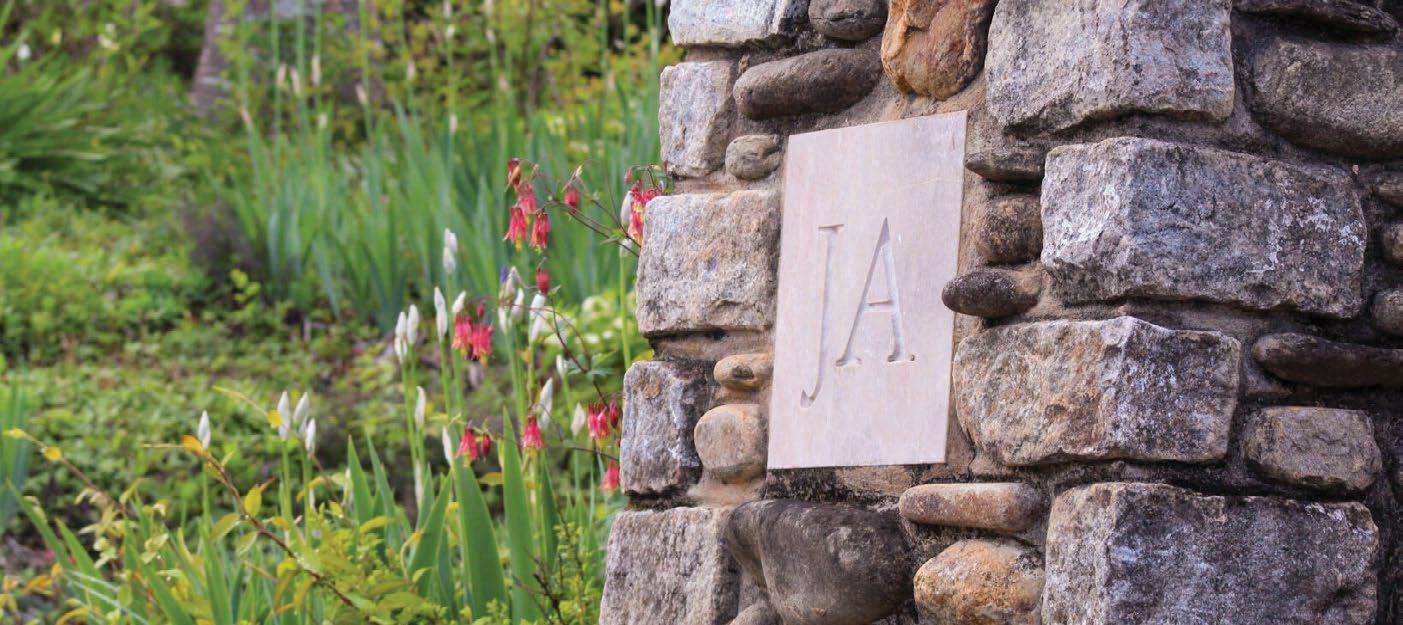
The park, which honors writer James Agee, was established in 2003 and since 2018 has been a Knox County Master Gardener project — part of UTIA’s Tennessee Extension Master Gardener Program. Master Gardeners are trained volunteers who assist with the upkeep of parks.
When I had had Maeby for just a few weeks, we went on our daily visit to the park, and Maeby befriended a volunteer who said he was getting the park all ready for her to enjoy. I felt so happy and grateful that there were people watching out for a space that had quickly become so important to me and my new dog.
Maeby and I are always finding new green spaces to explore — some of which people forget are just a short drive from campus.
Getting outside and gaining respect for nature doesn’t require hiking boots or a drive through the mountains. All around campus and Knoxville, we have opportunities to love the earth and explore it with the people — and furry friends — we love.
I have always loved nature. I grew up going to outdoor camps and taking trips to the Smokies, but small green spaces have taken on a new meaning to me as they offer a chance for animals and humans alike to take a break from looking at cookie-cutter buildings and litter lining the street to admire nature.

AUDREY NASH Columnist
When talking about climate initiatives and sustainability goals, it’s easy to get on a high horse and demand things of people that seem like they should be easy enough to do. When it comes to the climate issues the world faces, and that we and future generations will have to deal with, very little is going to be easy. I’m hoping that I can stay off my high horse.
If either of your parents are like my dad, you’ve probably heard the “if you want it, go get it” speech. If you haven’t, rest assured that its name is pretty much all you need to get from it. As I continue to study sustainability here at UT, I’m often reminded of that idea that my father instilled in me. If we want a greener world, then we must go get it.
When looking into climate issues along with all the other challenges faced by the planet and our society, it’s easy to get discouraged. News coverage can be pessimistic, and frankly, after a while, it’s hard to keep reading or watching. Which sometimes leads me to avoid it altogether and sometimes become uninformed on a subject. But when I started to apply the mindset of
“if you want it, go get it,” things didn’t seem so bad. It started to feel like a greener world was achievable. It becomes easier to stay informed and easier to do small things that lead to positive changes — it’s all just working toward a goal. And if enough of us work toward the goal, we will achieve it.
I’m sure some will read this and think my perspective is naive, and they might be right. But I choose to see it more as grounded optimism. We have to believe that a greener planet is possible to keep us passionate about what we’re working toward.
The point of all of this is to have a goal. You can’t achieve great things if you don’t even know what you’re trying to achieve. You don’t need to try to reverse climate change to be more environmentally friendly. You just have to start with a small goal.
If we as students, faculty or people involved in the UT community make it our goal to create a culture on the campus that values sustainable efforts and contributions, we will foster an environment where environmentally friendly actions become the norm. But it’s up to us.
If there is a time to advocate or to get involved with green initiatives, it is now and here. There is still plenty of hope for our planet, but no time to waste. It is clear that if left unchanged, our climate is headed toward a catastrophic tipping
point — but unfortunately, there is no global clock to tell us how long until that happens. Our campus and our world are our responsibility.

While 43% of American households participate in recycling, only 87% of the materials they put in recycling bins are actually recycled and sent to market as sellable commodities. This means that the other 13% of the materials end up in landfills due to contamination or their inability to be sorted.
Common misconceptions about recyclable materials and the recycling process itself cause many to unknowingly participate in “wishcycling” — a term used to describe when a person disposes of waste in a recycling bin believing it will be recycled when it most likely cannot be.
Here are five guidelines you can follow to make sure you aren’t the “wishcycler” of the friend group.
Take plastic bags and wraps to retail stores with recycling drop-offs
One mistake many recyclers make is attempting to recycle plastic bags and wraps, including grocery bags, candy wrappers, chip bags, zipper bags, toilet paper overwrap and more. These bags and wraps are stretchy and get stuck in recycling machinery, causing havoc to the sorting process.
Instead of putting your plastic bags and wraps in your curbside recycling bin, take these materials to a participating retail store with a designated recycling drop-off. These stores provide a way for your stretchy plastics to get to a facility that has the ability to sort and process them effectively.
Some local stores with recycling dropoffs include Target on Washington Pike, Walmart on Kinzel Way, Lowe’s on Clinton Highway and JCPenny on Kingston Pike. You can search for other stores near you that offer recycling services on Earth911’s recycling center quick search.
Dispose of glass at a city drop-off center
A less common recycling mistake, but still a prevalent one, is attempting to recycle glass products in curbside single-stream bins. When glass is put into single-stream recycling bins — those where all types of recyclables are mixed, as opposed to those that have separate bins for each type — the glass often breaks, making the load unsortable. The bin’s contents are frequently considered contaminated, and the whole load can become destined for a landfill.
Still, glass is a highly valued recyclable due to its ability to be recycled over and over while retaining its quality and purity. Though glass cannot be recycled in convenient curbside bins or single-stream systems, you can still recycle glass at several places around Knoxville.
One easy-access spot to drop off your glass is UT’s 24-hour Public Recycling Drop-Off located at 2121 Stephenson Drive Dock 24. There are also five City of Knoxville Drop-Off Centers — one in each of the four directional regions and one downtown — attended by Goodwill Industries.
Make sure plastic bottles and containers are clean and dry
Another action that leads to unintentionally wishcycling is depositing hard plastic bottles and containers covered in food remnants into recycling bins. Plastic and cardboard containers must be “empty and rinsed clean of food debris before being recycled,” according to the Environmental Protection Agency.
It can be tempting to toss your to-go boxes and soda bottles straight into the recycling bin, but doing so can soil the whole load and cause harm to the recycling facility’s machinery. Instead, rinse out plastic bottles and containers with water before placing them in a recycling bin. The good news is: These items are perfectly recyclable in curbside bins, which you can find all across campus.
Donate your used clothing
Textiles cannot be recycled due to complications in sorting, processing and costly mechanisms. While there are some textileto-textile recycling organizations working to find a cost effective way to recycle clothing, the system is not yet well established. Until the kinks are worked out, it’s better to donate your used clothing to secondhand clothing stores.
There are several stores in Knoxville that take clothing donations in small quantities and in bulk. Goodwill and KARM each have a number of locations around the city, and The Thriftique at Knox Pride, which opened in January, and Greater Goods on Kingston Pike both accept clothing donations of all kinds.
The Free Store on campus is another convenient place to donate your clothing and one that gives back to the UT community by offering secondhand clothing to students completely free.
Familiarize yourself with your state’s and city’s rules
The best way to ensure that you’re recycling the right way is to check your local recycling agency’s website for guidance. Recycling rules vary by state, and sometimes by city, so it’s important to be aware of what you should and shouldn’t recycle, as well as how to recycle various items, in a specific area.
You can find Knoxville-specific and Tennessee-specific recycling guidelines on the Tennessee Environmental Council’s website.
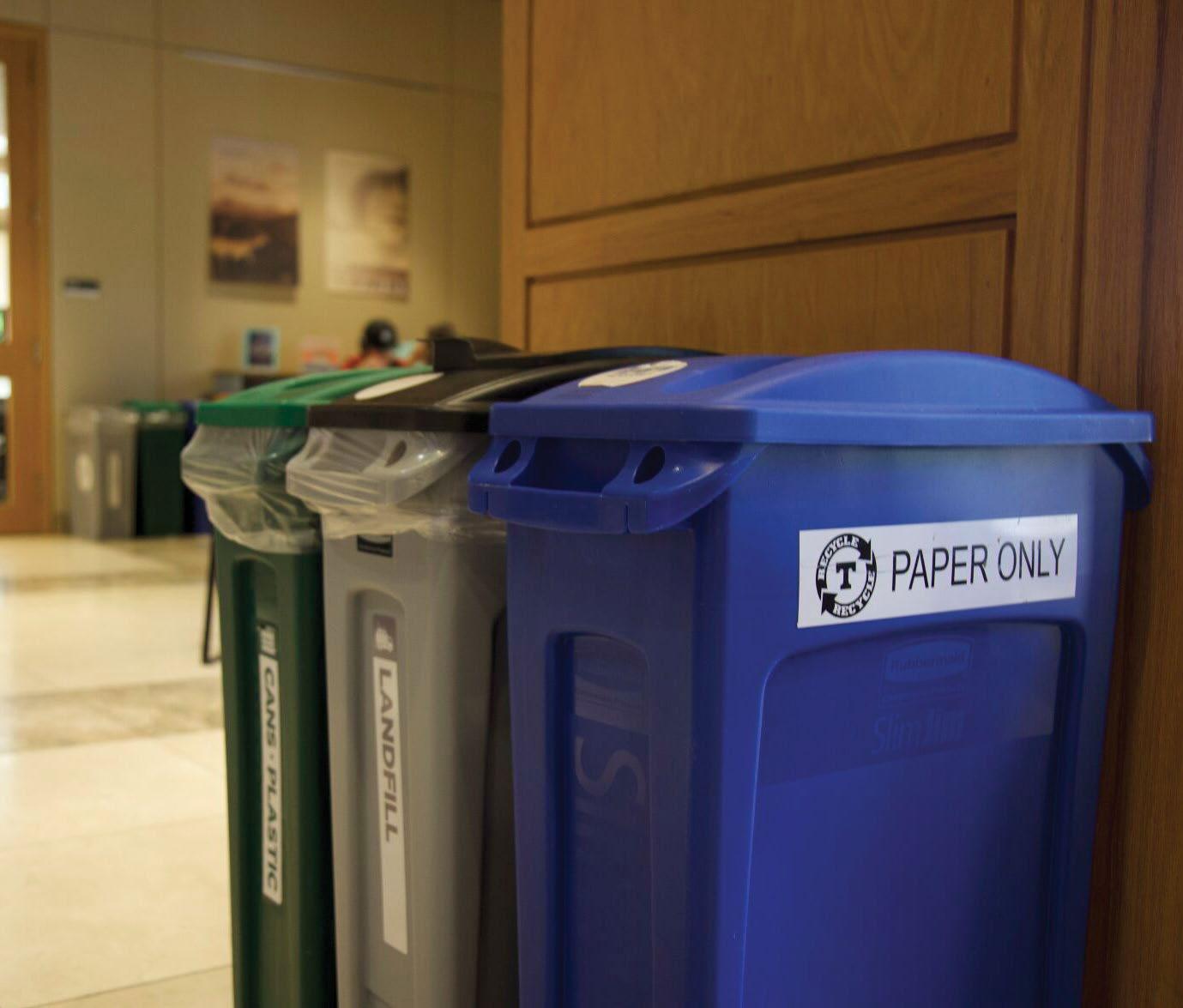

‘Justice is an essential part of sustainability’
SPEAK is looking to expand community engagement through environmental justice initiatives.
EMILY HURST Staff WriterOn April 22, Instagram stories across the globe are filled with images of picturesque hikes, sunrises and flower fields in honor of Earth Day. While it is a holiday that celebrates the Earth’s beauty, it also highlights the importance of sustainability. Here at UT, numerous organizations around campus are involved in sustainability initiatives to promote environmental awareness and foster an eco-conscious culture across the university. One such organization is Students Promoting Environmental Action in Knoxville.
As its acronym suggests, SPEAK prides itself on its ability to be a voice for change within the local community. Whether this is through more basic functions of sustainability, like recycling and composting, or through more complex projects, such as aiding in food disparity, SPEAK maintains an unchanging goal: encourage individuals to do the best they can to reduce their carbon footprint. Whether that be through vegan alternatives, shopping secondhand or taking public transportation, SPEAK encourages every individual to act responsibly and take care of the earth. Michael McKinney, advisor to and co-founder of SPEAK, believes that it can change the world for the better.
“It’s a good way for students to learn how to be effective advocates for social policies. Whereas a lot of other student clubs are obviously more social,” McKinney said. “With these guys, SPEAK has always really been a very selfless kind of club because they want to improve the world.”
Though SPEAK has had a consistent overarching creed, this year the organization plans to move in a different direction, emphasizing outreach into
the community and advocating for environmental justice. Ellen Barnes, a junior majoring in biology and upcoming president of SPEAK, sees a more cohesive and intersectional approach to sustainability in the future. Whether this be through more partnerships with organizations on and off campus, a push for more advocacy or higher member retention rates, there are plans to expand SPEAK’s reach and impact in the local community.
This year, for instance, SPEAK will adopt the duties of the Compost Coalition to promote engagement with the student body. Barnes attributes the organization’s smaller numbers to the split sustainability organizations on campus but remains optimistic about the potential of collaboration in the coming year.
“A lot of people started to form environmental organizations my freshman year,” Barnes said. “So we divided our members. … Another goal of mine is to bring people back together.”
While SPEAK is looking for collaborations on campus in order to become a cohesive force for environmental change, they are also interested in emphasizing advocacy and inclusivity within SPEAK and the surrounding sustainability community. SPEAK aims to become more involved in environmental justice initiatives by partnering with organizations like Rooted East Knoxville and the Free Store, which work to provide free clothes and food alternatives to those who are in need.
SPEAK sees sustainability as fundamentally intertwined with social and environmental justice. McKinney feels passionately about the impact of sustainability on social justice initiatives, such as aiding in food disparity. As a scientist, McKinney recognized that social inequalities are just as important, if not more important, than environmental inequalities.
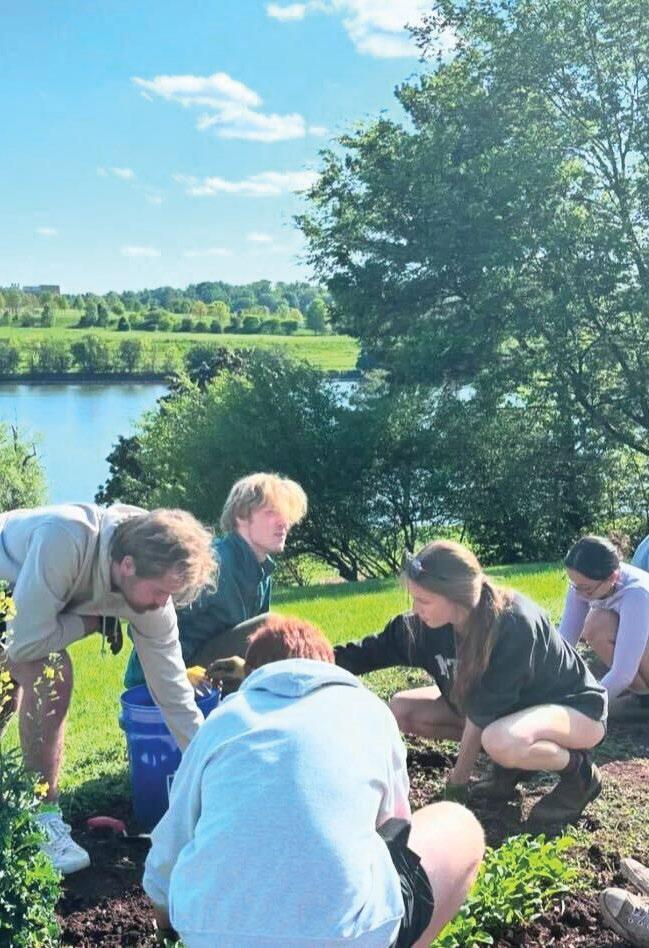
“There’s no point in having clean air and clean water and wildlife if people are, you know, they need each other. And there’s a lot of social inequities, which is what we have now,” McKinney said. “I realized that the social aspects are at least probably more important these days.”
Through these outreach and justice initiatives, SPEAK hopes to emphasize the importance of inclusivity and intersectionality as environmental injustices disproportionately affect marginalized communities. They also hope to be educators in the community and advocate for true change through their composting and recycling events. Barnes urges anyone interested in
getting involved with the community to attend one of their meetings and learn more about what SPEAK does and how important sustainability is. SPEAK’s upcoming Earth Week events focus on sustainable cooking and shopping, and they will participate in the Earth Day Festival at the Student Union Plaza. McKinney offers words of advice to anyone who is not an environmental studies major who would like to get involved in the sustainability movement. “Find what you love to do,” McKinney said. “Whether you’re a writer, or an engineer, or a business person, do it. But use that as a tool to promote sustainability.”
About 30 minutes south from the UT Agriculture Campus is the East Tennessee AgResearch Education Center Little River Unit. This 529-acre tract is utilized to provide land, equipment, livestock and support for the Herbert College of Agriculture and the College of Veterinary Medicine by fostering research and instruction.
The Little River Unit primarily emphasizes Holstein cow milking and production, as well as evaluates the interaction between animal agriculture and the environment. This is a state-of-the-art unit featuring multiple new facilities and technology. Through these innovations, the unit has been able to advance their sustainability efforts tremendously, strengthening the ultimate goal of agricultural environmental harmony.
The unit’s newest sustainability effort involves the use of robotic milking systems, known as Lely Astronaut 5 units.
“These robotic units allow a much more natural approach to milking cattle by allowing them to milk on their own timing, as many times as they like, all without ever leaving their daily environment,” said Kevin Cornett, a senior research associate with the Little River Unit. “Along with continual access to food and water, this type of milking system lowers animal stress and does not center the animal’s typical day around a man-made schedule. Lower stress to our animals can translate to increased health, better nutrition, increased milk quality, and greater longevity of the animals we care for.”
In addition to this technology, the Little River Unit has several other sustainability systems in place, including sand reclamation and waste management systems. Many of these systems take a cyclical approach to ensure products are being continuously recycled throughout the environment.
The unit’s sand reclamation system uses gravity to recapture sand used for animal bedding. The captured sand is cleaned and reused to minimize the impact of sand dredging and hauling costs.
“Waste management at our dairy is a complete cycle,” said Tate Walker, manager of the Little River Unit. “When an animal urinates or defecates, that waste is washed into a system where solids are removed to be used as fertilizer or mulch. The remaining slurry is then pumped onto our crop fields and pastures, which contributes to the majority of our herd’s diet. This diet, when fed back to our animals, completes the cycle as it is processed and
excreted again as waste.”
Some sustainability features unique to the Little River Unit include human-made areas that serve a greater purpose for management and educational opportunities while supporting habitats for the cows along with other wildlife.
“We also have multiple created wetlands on our site,” Walker said. “These wetlands act as a filtration system for crop and pasture areas by capturing both runoff and subsurface drainage systems. These habitats support a plethora of wildlife and are used to teach students in addition to their environmental purposes.”
Other human-made ecosystems include grazing pastures that support animals while cutting down on feed costs.
“In our pasture areas we have a large swatch of native warm-season grasses for our animals to graze,” Walker said. “These grasses are not only fire-resistant, and a wonderful erosion-prevention tool, but also offer habitat to many native species found throughout east TN.”
These systems focus on making the animals’ habitats at the unit as natural and safe as possible so that there is mutual benefit for both the animal and dairy production.
“The trend is moving toward raising animals in an environment much like nature originally intended, but in a way that reduces risk from predators, disease and mortality,” said Ethan Parker, director of the East Tennessee AgResearch and Education Center. “Along with this, there is a heavy focus on feed efficiency, as reducing feed costs and amounts by feeding more rich diets helps to reduce the environmental impact of row crop agriculture including pesticides, fuel consumption and soil disturbance. There is also an important interface of using our wetlands to demonstrate how to sustainably raise cattle herds next to a pristine watershed like the Little River through environmental monitoring and correct installation of mitigation measures.”
Beyond its own spaces, the Little River Unit houses sustainability efforts that impact the greater region of East Tennessee. The Little River Unit is home to plots that support the Tennessee Tree Improvement Program. These efforts focus on increasing the quality and durability of East Tennessee timber strands in forested areas, including the Great Smoky Mountains National Park.
“A final sustainability focus that is up and coming is our transition to beef-ondairy,” Walker said. “Across the U.S., beef is raised on grain and in pastures. Using beef-on-dairy, we are leveraging the reproduction at our dairy to produce beef/ dairy crosses that have higher utilization
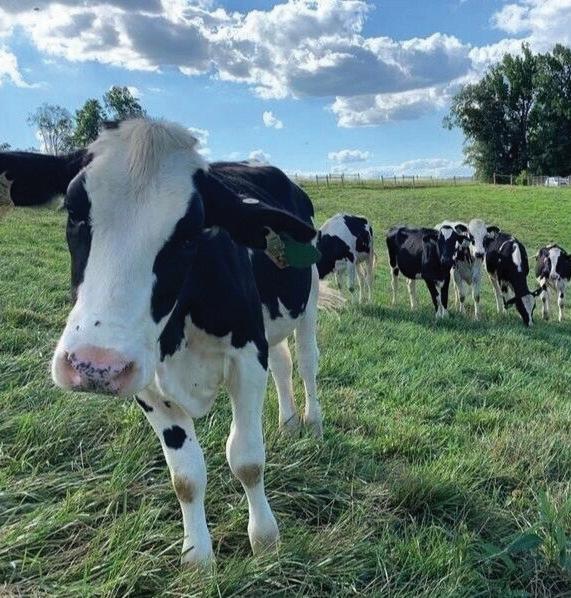
for meat production without increasing the need for raising more beef animals at beef-cattle facilities.”
While the Little River Unit is fortunate enough to have multiple sustainability resources at their disposal, other dairy production facilities may not have access to newer technologies or the capital to afford them early during their adoption. The Little River Unit aims to help these facilities through their research and information.
“We can help by adopting the technology and providing research-based information to help producers decide whether that technology may be a good fit for their own operations,” Parker said. “While many other dairies have the same mitigation systems present at the LR Unit, we have a difference in our ability to capture data and study it more in-depth to use it to improve our operation but also share it with others to grow the entire industry across the state and region. For example, we have more environmental monitoring and pathogen monitoring ability than most dairies and also have the weekly presence of a UT veterinarian which helps us stay on top of health concerns.”
This current research includes feed studies, behavioral studies and training, and vaccinations.
The two feed studies currently being conducted are calan gate studies that examine different mineral supplements for animal health, as well another similar one
using robotic pellets.
Since robotic milking is a newer practice for the facility, the unit is still working on determining the best practices when installing these into a new facility. Calf behavior research is being done through co-milking and adjusted weaning dates to improve calf health and reduce mortality. Finally, vaccine research is being conducted to prevent mastitis caused by a variety of bacteria and viruses.
The Little River Unit’s sustainability efforts have evolved throughout the years through the introduction of agricultural technology and research methods that have changed the landscape of agriculture production and management.
“We are certainly more sustainable today than ever before,” Parker said. “Precision technology, advances in animal husbandry and genetics, along with increased attention given to animal diets have all contributed to better longevity of animals, greater production and decreased environmental impact.”
Sustainability is a growing trend in agriculture, with more facilities like the Little River System making the investment in technology and systems that benefit the animals and the environment. These efforts serve are serving as a critical model for UT agriculture students and can inspire a new perspective in all those who are involved with agriculture, either directly or indirectly.
Although dirt serves as an antidepressant and can strengthen the immune system, college students rarely have an opportunity to get into contact with it. UT’s Grow Lab offers a unique chance to get anyone who is connected to the university outside and playing with dirt, all while learning.
“We want to get everyone involved in nature,” said Samantha Daulton, Grow Lab coordinator. She studied environmental policy at Loyola University and officially took over the Grow Lab in January 2024.
Currently nestled between a few frat houses and the Early Learning Center located on Lake Avenue, the Grow Lab is a pleasant getaway from the bustle of campus.
Upbeat music quietly resonates from a small speaker nestled into the grass. Twenty-two raised gardening beds host collections of various plants or soil. Small trees in the beginning stages of growth pepper the bottom of the slope, while at the very top, four concrete blocks have been painted to say “Growing a greener UTK.”
Daulton says the Grow Lab was designed to be a living laboratory. Her job includes a variety of duties, including outreach, event planning and experimental planting.
“Part of the whole laboratory part of it is, even if I’m just growing strawberries, I’m gonna try to grow six different kinds of strawberries because we don’t know what strawberries are gonna do best here,” Daulton said.
She takes into account the East Tennessee climate as well as the microclimate of urban university life. Constant nearby construction and the rising wind speeds keep her constantly aware of outside factors.
Although the Grow Lab is supportive of all pollinators, there can be challenges with what many would label “pests.” Daulton hesitates to label anything interacting with the Grow Lab as a pest, but she is quick to control their impact. If rabbits begin to harm the plants, she might fence the crops but wouldn’t act against them in any way.
The Lab is also situated on a steep hillside that poses its own problems.
Originally, the lab’s location was a private residence that was eventually torn down, but the old building materials weren’t fully cleared. Now, as volunteers work to clear the rocky hillside, they often come across concrete blocks, blinds and even door frames. The slope is also littered with invasive plants that volunteers are working to remove.
“It’s been a lot of literal blood, sweat and tears,” Daulton said, explaining that invasives taking up root on the slope — like tree

of heaven — can serve to attract even more invasives, like the spotted lantern fly.
“As soon as you notice one, they’re everywhere,” Daulton said. “Tennessee is officially under lantern fly watch, meaning we absolutely need to get rid of tree of heaven before they show up on our campus.”
The Grow Lab donates all of its produce to the Big Orange Pantry where it is immediately accessible to students, faculty and staff.
Giuliana Castillo was the last student garden manager for the Grow Lab. She oversaw multiple beds and worked to cultivate plants throughout the seasons. Castillo said during the summer she would harvest almost every single day and donating to the Big Orange Pantry was a highlight.
The Grow Lab was a great experience for Castillo’s senior year as she worked to finish a degree in economics with a minor in plant science.
“I loved it. It was the best job because I just got to have my own little garden,” Cas-
tillo said. “I hope that (the Grow Lab) gets more awareness. I think it’s a great space. … I think Sam is doing a great job.”
The Native American Student Association also plays a part in the Grow Lab, and their beds are always the most successful, according to Daulton. Led by associate professor Lisa King, members of NASA cultivate beds of native plants.
“My favorite part of the Grow Lab is that it’s a way to put knowledge into practice, and it’s such a flexible space that we can work there as we can (as opposed to getting locked out of buildings or struggling to find a room to meet in),” King said.
This next season, plans are being made to include Native languages through signs naming different plants.
“It’s another way of knowledge sharing between NASA members and also anyone else who visits the garden,” said King.
The Grow Lab harvests include a variety of produce, including spinach, beets, peppers,
basil, okra and tomatoes. The new postage stamp orchard — which just refers to its small size — supports over 13 native trees, including persimmon and apple. Native plants will have far more success because they are meant for that environment.
Daulton has big plans for the Grow Lab. She works to get the wider Knoxville community involved through events like Pollinator Parties, and she hopes to gain approval for the Grow Lab as a master gardener site. With the approval, anyone pursuing or maintaining certification as a master gardener could spend their volunteer hours in the lab.
Daulton’s enthusiasm and love for the Grow Lab is evident.
“It’s really nice because it feels like it gives a common ground for groups that don’t normally interact. … And it’s a common ground about plants,” Daulton said. “Like, we all eat, we all need things from the ground, so it’s a really nice equalizer.”
The University of Tennessee has a great addition to the Hodges and the Pendergrass library: the seed libraries. The seed libraries in both Hodges and Pendergrass are open to all staff and students. The Hodges seed library is on the second floor near the front entrance, and the Pendergrass seed library is near the computer lab.
According to the University of Tennessee’s seed library website, the purpose of incorporating a miniature garden within the two libraries is to “move forward the frontiers of human knowledge and enrich and elevate the citizens of the state of Tennessee, the nation, and the world” by instructing the students about the importance of living healthy and food availability.
Food insecurity is a prominent issue, especially among college students. For example, the Help Center at Temple University states that “overall, 23% of undergraduates, and 12% of graduate students, are experiencing food insecurity. This means more than 4 million students are food insecure.”
Luckily, the University of Tennessee has many resources to help students who deal with food insecurity. Some of the resources include the Grow Lab, Big Orange Pantry and the Seed Library.
In both seed libraries, there are a variety of seed types to choose from. For example, the Hodges library has food products such as beans, tomatoes, broccoli and watermelon seeds. Pendergrass library has similar seeds as well as wildflowers and flowers.
Sarah Johnson is a librarian at the University of Tennessee and was raised in Knoxville. Her job is to help students and staff find the resources they need in the library. Johnson spoke about why she loves being a Vol librarian.
“I get to teach, review and organize collections, and interact with new people,” Johnson said.
Like Johnson, Samantha Ward is also a librarian who is the director of the Pendergrass Agriculture and Veterinary Medicine Library. She grew up in Tennessee and worked part time at a library. This side job inspired her to make a career out of it.
When Johnson brought the idea of a seed library to the administration, they thought the idea was beneficial and added it to both libraries. Ward spoke more about the administration’s thought process for the seed library.
“In 2016, UT set a bold new initiative to enhance students’ development and educational experiences through experiential learning. The UTK Seed Library was developed to support that vision by facilitating engagement through experiential learning opportunities across the curriculum, creating opportunities for learning communities, transdisciplinary projects, and re-
search opportunities for students and faculty,” Ward said.
Not only does the seed library help with food insecurity, but it is also useful in academic settings. Students can take seeds to grow them for their courses. The Grow Lab has also used them to grow products that are then sent to Smokey’s Pantry. Ward spoke more about the other opportunities that come from the seed library.
“A couple of the other cool things that we’ve done have been working with UT’s Entomology and Plant Pathology Department and Bee Campus initiative to host a honey tasting and also collaborating with McClung Museum to host a talk with their curators that was accompanied by a soil painting activity and a seed collection exhibition,” Ward said.
In addition to the food going towards those resources, the seed library was a tremendous help for supporting Vols in need during COVID-19. Further, in 2020, the people in charge of the seed libraries shipped seeds home to students. This was part of the Seed to Table Summer Program where any student could sign up to get seeds and learn more about the process online.
The process to start building your own sufficient garden is quite easy. All you need to do is go to one of the libraries and pick out your desired seed packet. Once you have your seeds, you can take them home with you and plant them without needing to return anything. It is recommended that no one takes more than five seed packets to make sure there is enough for everyone.
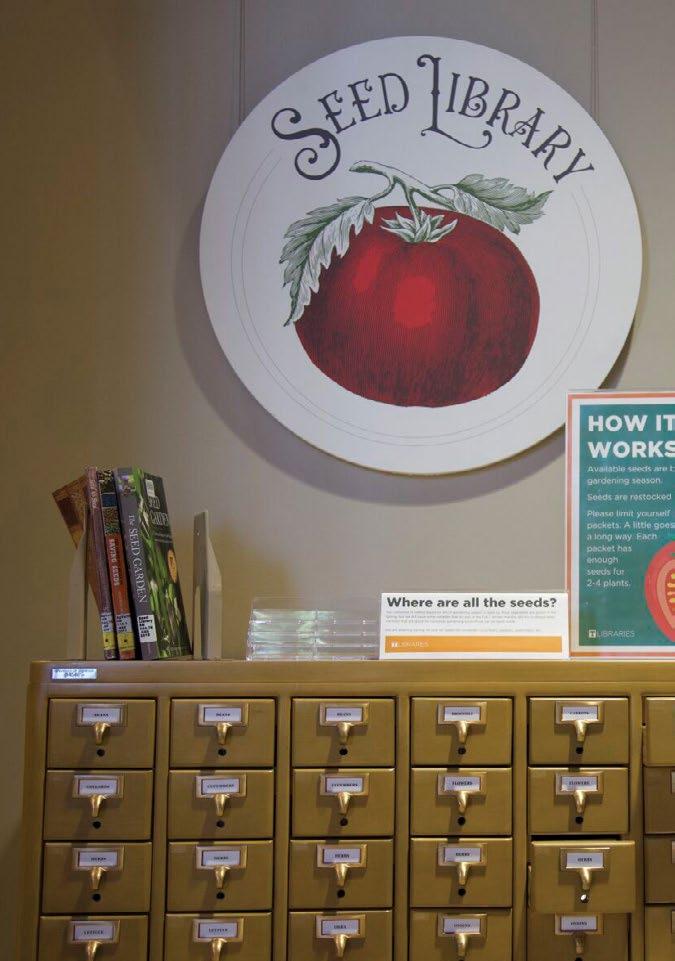
The seed library in Hodges is open to all students and aims to instruct people about the importance of living healthy. Monday, April 22, 2024. Abby Ann Ramsey / The Daily Beacon



Thursday, April 25, sees the return of UT Recycles and the Office of Sustainability’s 3rd Creek Clean Up. A celebration of Earth Week, which starts the previous Monday, the event takes place from 9 a.m. to 12 p.m. with a mission of sanitizing, beautifying and promoting a greener campus for students, faculty and staff alike. Registration for the event is available through a Google form on the Office of Sustainability’s website.
The event’s main goal is to pick up litter in and around one of UT’s three creeks that are visible from campus, and efforts are made in all sorts of different ways. Gloves, pickers, trash bags and even kayaks provided by University of Tennessee Outdoor Pursuits to recover litter lost in the actual water will be available upon the day of the event. Participants will meet at the Recycling Warehouse, be shuttled over to third Creek in waves and begin the cleanup process. As trash comes in, participants will sort it by recycling and landfill to be weighed at the end of the event to see how much was recovered from the waterway.
In the second year of the event, it’s one that UT Recycling and the Office of Sustainability
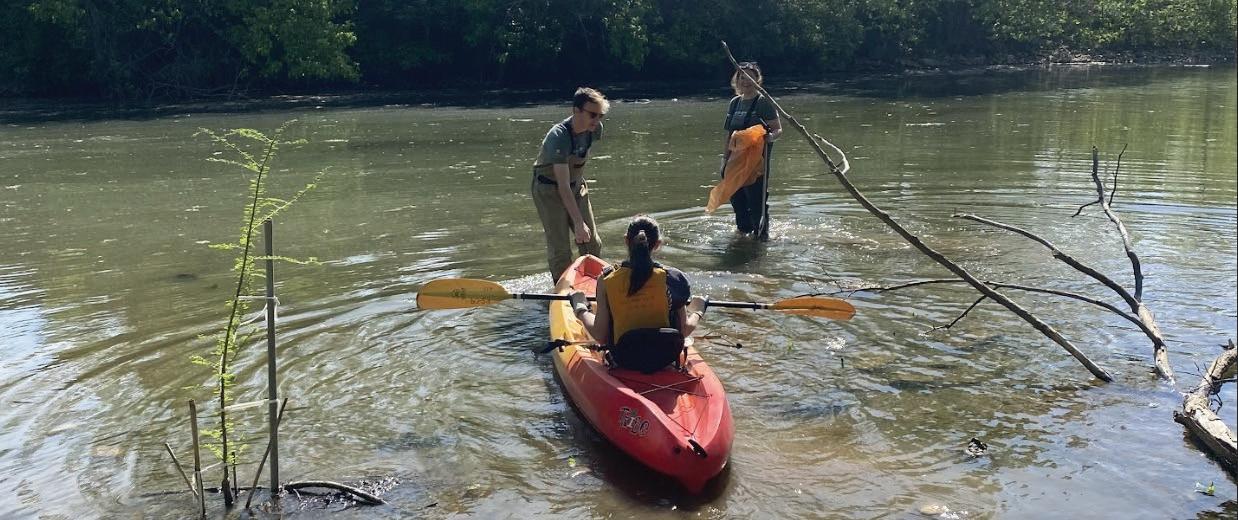
feel passionate about, especially when it comes to participation. Their efforts are ones they hope will have a long-term effect, with those who participate realizing that results may not be yielded immediately. Samantha Daulton, the Grow Lab coordinator for the Office of Recycling, says the mission is one that spans far past one generation of students.
“The mission of sustainability is that we are trying to make sure that we’re meeting the needs of our current generation while also reserving things for future generations,” Daulton said. “And third Creek is beautiful — there’s a greenway that runs along it. It provides aesthetic enjoyment of the outdoors around campus. So,
if we continue to deteriorate that environment, there is going to be nothing left to enjoy. There are signs around third Creek that literally say ‘do not swim in this water,’ and that’s horrifying.”
One of the main ways Daulton and her team try to make this event resonate with students is to have it provide a better education on waste and how it’s often so easily disposed of improperly. When trash is thrown away, regardless of where, it has to go somewhere, and it ends up in one of our waterways more often than it should. For students, at least for four years, that kind of waste affects not only their campus but their community. For Daulton and her peers at AmeriCorps, increasing that scope of concern is
significant in terms of a greener Knoxville even five years down the line.
In recent years, UT has taken big leaps forward as far as stewardship toward the natural world in both its recycling and sustainability efforts. Sustainability is now a full-fledged major and field of study, and even the new implementation of trees on Volunteer Boulevard do far more than beautify campus. The trees, planted by the Office of Sustainability, capture stormwater and put them to use watering plants seeing a lack of nourishment. UT now also has a full time stormwater coordinator, Garrett Ferry, who’s been focused on fighting the corrosive effects of erosion during his tenure.
Overall, events like this go to promote a greener and longer lasting natural scenery around our campus. Jay Price, the sustainability manager in the Office of Sustainability, sees the amenity as a huge blessing to campus and its community.
“The water quality needs help,” Price said. “It’s a non-touch stream, and it’s polluted by non-direct routes such as littering. There’s issues with invasive species, but it’s still an important ecosystem that deserves protection and enhancement.”
As far as supplies, coordinators suggest that participants arrive in long pants, sleeves and closed-toed shoes as there is poison ivy along the creek trail. Water, preferably in a reusable water bottle, is also suggested.
In a time where fast fashion and clickable clothing ads rule the shopping market, shopping secondhand isn’t at the masses. For a select group of fashion-forward shoppers, thrifting is a way to build a wardrobe while being environmentally conscious.
Thrifting has grown in popularity throughout East Tennessee with weekend vintage markets and online secondhand shopping. Still, for Berkeley Bowers and Bryson Richie, thrifting comes as a passion and a project.
The couple started thrifting together in high school, each creating their niche style — Y2K for Bowers and unique pieces for Bryson. Although thrifting consistently started in high school, Richie’s passion dates back to elementary school.
“In elementary school, I watched a YouTuber who taught you how to dress for less,” said Richie. “When I was 16 I got my license … and started thrifting anywhere I could and only bought stuff for myself. Whatever wasn’t in my size I left behind.”
As Richie built his capsule of unique clothing and thrift finds, peers at his high school noticed his newfound items and asked if he could buy pieces for them. High-commodity items like vintage shirts were top requests for Richie and
thus sparked the inspiration to start a secondhand store.
“It wasn’t until people I went to high school started asking for certain stuff like old Tennessee stuff to be specific. And I started picking up that and then started selling it,” said Richie.
Richie turned this side hustle into a full-time business last February when Richie’s Riches opened its first storefront on North Broadway Street.
The couple collaborates in curating the store’s products as Bowers has an online sustainable clothing company, The Thrift Fairy, and sells as a vendor out of the storefront. Although she had an eye for fashion, Bowers didn’t pick up thrifting until she started dating Richie in 2020.
“Besides the Y2K stuff that I already knew about … it was all just through him and him sending me out and about to look for stuff when he couldn’t go. … I just had to learn through him showing me just like certain brands and tags,” said Bowers.
Style is subjective, and the couple finds shopping for the store to be a balance between finding staple pieces and items that are guaranteed to sell.
“I definitely have my best sellers,” Richie said. “I also put in store what other people liked even if I don’t like it. I’m not a big fan of Harley Davidson T-shirts, but a lot of people like that.”
As a store owner, Richie stays aware of trends
by following other fashion accounts to see what other people are wearing, not just as a seller but as a consumer himself.
There was a rise in secondhand shopping during COVID-19 as outdoor markets were more accessible. The rise in thrifting has led to a rise of individualism and sustainable shopping and Bowers and Richies influenced the Knoxville area to shop secondhand.
“We are two people who have definitely influenced others to shop secondhand first,” Richie said. “I do think it makes an impact sustainably. … And also it helps out other people who are just now into this and are trying to sell more.”
Shopping sustainably doesn’t happen all at once. With each item of clothing, shoppers get more comfortable with the idea of being intentional with their buying. Bowers does this by motivating her inner circle to implement sustainable shopping initiatives.
“I offer … why don’t you come in the store and try on some of the stuff that I have and I’ll discount it for you,” said Bowers. “If you do buy something on a fast fashion website, maybe think about if you’re gonna wear it for more than one time before you buy it. It’s like putting little seeds in people’s heads to make sure that they’re fully and consciously thinking about what they’re buying and what their money is going towards.”
Whether in a small group, vintage market
or at the Richies Riches storefront, Bowers and Richie use thrifting as a creative outlet to connect sustainability with style.
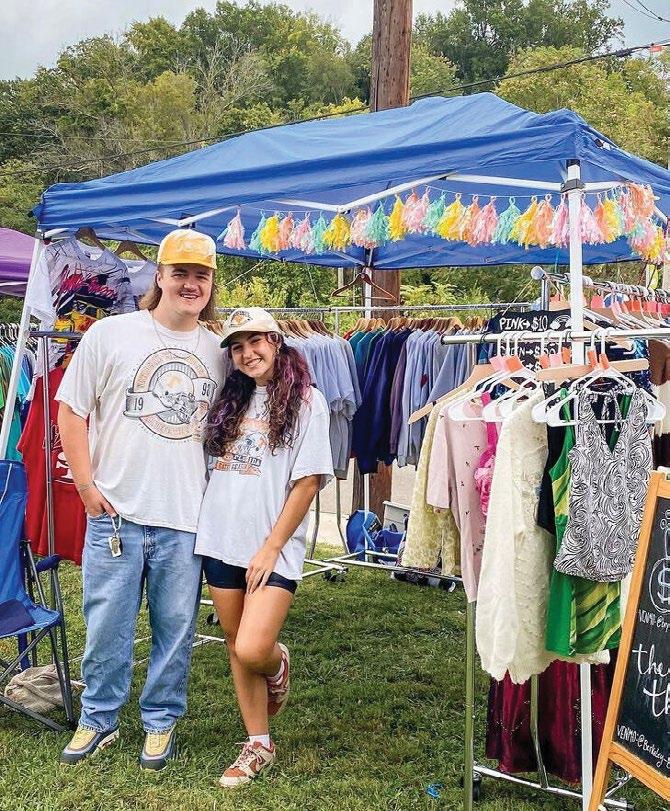
Bryson Richie, owner of Richie’s Riches, and Berkeley Bowers, creator of The Thrift Fairy, started thrifting together in 2020 and have progressed their small businesses ever since becoming vendors at local vintage markets. Courtesy of Bryson Richie and Berkeley Bowers
College classes are frequently defined by time spent sitting in a classroom learning about concepts that you can one day apply to your work in the real world. Students in Elizabeth Meredith’s English 255: Public Writing course, however, are stepping beyond campus to apply what they learn in class to work that has a direct impact on food insecurity in the community.
Four students in the class have formed the group “The Food Fighters” in order to raise money for a mobile market for Knoxville’s BattleField Farm. BattleField Farm was started by Chris Battle, a pastor at Tabernacle Baptist Church, in 2018 with the goal of ending food insecurity through collaboration with other community members that makes food more accessible and prioritizes education.
Battle’s church — located in the 37915 zip code — is two miles away from the nearest grocery store. He noticed the impacts living in a food desert had on the people nearby and sought to come up with a way to solve the problem. Battle started a community garden and has also partnered with Nourish Knoxville to start a farmers market in the area. On top of that, other churches have worked with Battle to start their own community gardens, and BattleField Farm has a veggie van named for civil rights activist Fannie Lou Hamer that delivers fresh produce to East Knoxville residents twice a week.
Ultimately, Battle’s goal is to start a grocery store for the community that is affordable and accessible. Until that can happen, students in the public writing course are helping Battle raise money for a mobile grocery store that can deliver food to residents, especially because access to transportation is a barrier for so many people in Knoxville.
For the students, the project has helped them learn about how food injustice has a tangible impact on the community around them while helping them explore their career opportunities. Olivia Choate, a sophomore studying supply chain management and sustainable landscape design in the group, was attracted to the project because of its connection to sustainability and landscaping.
“When I saw this, I thought it would be a great opportunity to see and experience how landscapes are directly serving underserved communities,” Choate said. “Being able to get nutrition directly to people but also allowing them to partake in growing that food and getting it to your own communities — I thought was really cool.”
Part of BattleField Farm’s mission is to involve residents in the gardening process so they can immerse themselves in the land and
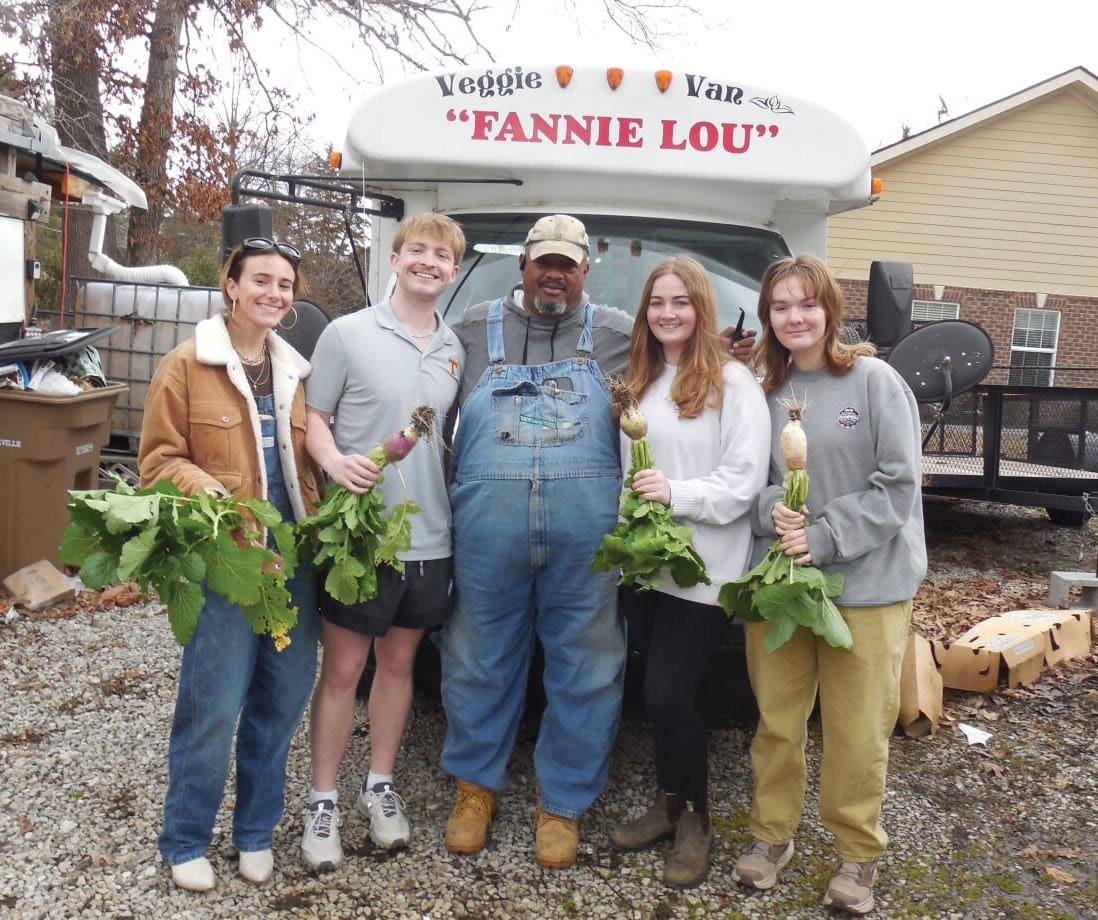
see their seeds turn into nourishing foods. Battle said this is especially important in relation to sustainability in that generations of people can learn how to continue to prioritize food and stay connected to the earth.
“I mean, grown folks seeing their first cucumber,” Battle said. “I mean, just the excitement and the joy because they put the work into it. They watched that seed grow and nurtured it and watered it and weeded around it, you know, and took care of it.”
For Battle, tending to the soil feels like church to him, and using the garden as an arm of his ministry has been a goal of the project.
“For me, this is a faith journey because people wouldn’t come to my Black Baptist brick-and-mortar church. But they would come to my garden,” Battle said. “I’ve met wonderful, peace-loving, great people just from doing the garden. And so it’s been a
wonderful joy.”
The mission of the farm and the mobile market that the Food Fighters are fundraising for is about more than just providing food — it’s about justice.
“Honestly, your zip code system shouldn’t determine your access to fresh fruits and vegetables,” Battle said. “And if you don’t have any control over your food source, you’re not really free.”
That’s one major takeaway that the students have had from working with Battle. When you’re constantly on campus, you might not be exploring the community as much and seeing the issues that come with food disparity in Knoxville.
“I knew about food deserts, but I didn’t know how severe it was, especially right where we are,” Ava Hope-Ross, a sophomore majoring in retail merchandising and management in the group, said.
Not only are students seeing the impacts of food insecurity in the area first hand through the project, but they’re also learning about how important the process of growing food is and how powerful it is to think about how food made it from the ground onto our plates.
“It’s definitely made me appreciate food in general and where that comes from,” Lolly Cram, a sophomore marketing major in the group, said. “Especially now, I don’t want to waste anything because it’s so valuable.”
The area that Battle focuses on is not the only food desert in Knoxville, and his goals extend past the 37915 area.
“Once we turn this desert into an oasis, then we’ll be able to move on to the next,” Battle said.
The Food Fighters will have a fundraising event on Ped Walkway later this semester. You can donate to the Food Fighters campaign through their Indiegogo webpage.
When the UTK Compost Coalition was founded in 2021, its primary goal was to increase compost access in dorms and across campus. However, in the last year, the club has shifted its focus to improving education and outreach, according to copresidents Julia Craven and Kelly Su.
Craven is a senior studying the engineering of sustainability in the College Scholars Program, and Su is a sophomore double majoring in economics and global studies.
“(That) may sound a little random, but they’re like two planets revolving around the sun, which is sustainability/the environment,” Su said.
Both Craven and Su have been involved with the Compost Coalition since their freshmen years. According to Craven, the Compost Coalition recently transitioned away from its original purpose not because of a lack of interest but because of a lack of logistical support.
“It was really challenging to have a relatively small number of people take on a pretty big task,” Craven said. “So, a lot of it now has pivoted toward educational opportunities, engaging with other clubs, spreading awareness … as well as taking on more scalable opportunities to better integrate composting. In general, with composting and any type of environmental issue, (that) starts with education before change.”
Craven explained what kinds of materials can be composted and how the process works.
“Depending on the size of the compost facility, you can compost pretty much anything from meat, dairy, eggs, vegetable scraps, fruit … that kind of nature, ” Craven said. “Basically, any food waste that would normally be sent to a trash can, can go to a compost facility and be processed.” Composting also ensures that materials can be repurposed instead of wasting away in a landfill.
“Soil is a little bit distinct from dirt because soil is going to have nutrients for different plants and such,” Craven said. “And it’s kind of like a recirculation back into our environment.”
Composting at UT is divided into two categories: front-of-house and back-ofhouse. Back-of-house compost includes any waste that is created during the food production process on campus.
“So if you’re a worker in the back of Stokely, for example, and you have veggie scraps, that gets sent to a compost bin that’s picked at a location on campus and

then driven to our compost site where it’s composted,” Craven said.
Front-of-house is produced by consumers on campus.
“There’s not really a waste stream associated with having this specific composting bin for people who may, for example, eat out at the Student Union,” Craven said. “So, we’re trying to really push for frontof-house composting as well as back-ofhouse.”
Craven says back-of-house composting is pretty functional as it stands, but frontof-house composting is more of a challenge because education and consistent engagement are such large components of it. To address this, the Compost Coalition has been partnering with other clubs on campus that share a similar passion for sustainability.
For instance, the Compost Coalition is currently working with the Sustainable Business Organization — the Haslam College of Business’s first sustainability club — to include more compostables at dining locations on campus. They’re beginning this process at the UT Creamery by introducing a pilot program that implements fully compostable materials with one specific waste stream.
Other organizations the Compost Coalition collaborates with include the UTK chapter of the Society of Ecological Restoration and Students Promoting Environmental Action in Knoxville — more com-
monly referred to as SPEAK.
One such collaboration was a food sustainability-themed event titled “Mix It Up” that took place April 23. During the event, the Compost Coalition and SPEAK shared tips on how to reduce food waste when cooking and offered affordable, environmentally-friendly recipes to try. The Compost Coalition also hopes to collaborate with Food4Vols in the future to offer additional cooking classes for students.
Craven mentioned that Ella Dohrmann was hired as the compost supervisor at the UT Compost Facility in March, and the two have already started establishing a positive relationship and communicating about how to ensure a bright future for composting at UT.
Through Dohrmann, students can request tours of the UT Compost Facility. Su said volunteering there with students in the Compost Coalition and its advisor, Chad Hellwinckel, has created some of her fondest memories with the club.
“It’s really fun turning compost and seeing the science happen right in front of my eyes,” Su said. “It’s also a joy to catch up on life with people who care about the environment! Compost tours are also really fun, and I feel like I learn something new every single time.”
With Craven graduating this semester and Su returning to the Compost Coalition for her junior year, they shared their hopes for the future of composting at UT
and how the practice is regarded by the campus community.
“I hope composting can become more accessible at UT and that the administration can commit to make composting a norm at the university and in the community,” Su said. “It may not be the most pleasant-smelling natural process, but given the capacity of our university and the waste that we produce every single day, it’s our duty as stewards of the environment to make composting easier for everyone.”
Craven emphasized that students should care about composting because it directly affects the environment both on campus and in the greater Knoxville community.
“I think, I think the point of college is to learn new things about our world and think critically about the way in which we engage with it,” Craven said. “When we think about nature and the way in which we interact with it constantly, they’re really important spaces to maintain. … I think compost is a very physical component to that in the sense that it feeds the things that give us life and joy.”
While the UT Compost Facility only processes compost produced on campus, students who live off campus can take advantage of compost resources across the city. Additional information, including different compost drop-off locations, can be found on the City of Knoxville website.
UT’s Agriculture Campus has been home to one of three sites for Tennessee’s official state botanical gardens since 2013 — over 10 years. Though current managing director, James Newburn, has been with the gardens for more than 30 years.
Throughout his tenure at UT Gardens Knoxville, Newburn has seen the gardens through several large developments — from trialing to fighting climate change to becoming the official State Botanical Garden in 2013.
Initially started as a trial garden for the Department of Plant Sciences in 1983, the main reason for the gardens’ inception was perfecting annual plants to be judged by All-America Selections. Over the last 30 years, Newburn has seen them transform into a popular local attraction.
“We weren’t really expecting a lot of guests to come. But as you drive down Neyland Drive, and you see these beautiful flowers, you’re like, ‘Wow, look at that nice garden. I wonder if I can go there,’” Newburn said. “And one of the battles that we fought over the past 40 years is: Yes, you are welcome to come to the UT Garden. It is free, open to the public.”
Newburn first assisted with trial beds in 1993 as a student assistant. He was officially named director in 2023 after serving in an interim role since 2019.
He was also quick to highlight the gardens’ current goal of being “an example for sustainability.” Through avenues like the student green fee, state funding and various fundraising efforts, UT Gardens have vastly altered practices in recent years for the sake of conservation.
“There are a lot of infrastructure improvements that we’re making to address sustainability and environmental concerns like climate change,” Newburn said. “We have, as of last year, through student green fee money, converted almost all of our gas-powered equipment with battery-powered electric equipment. And that has made a huge difference.”
In addition to emissions reduction, Newburn also attributed the institution of electric equipment to lower maintenance costs and a quieter, more peaceful environment.
“For one thing, we don’t have to keep purchasing gas,” Newburn said. “And for our guests, all that machinery is a lot quieter just because it’s not a combustion engine.”
Also in the name of sustainability, UT Gardens’ Kitchen Garden donates to local food bank distributors, yielding over 5,000 pounds of fresh produce in 2023.
“We have a kitchen garden that’s been recently renovated, again, thanks to a grant from the student green fee, where we show how you might grow small fruits, vegetables, herbs, edible flowers, in a restricted space, like a raised bed in a city lot,” Newburn said.
In the spirit of the university, UT Gardens
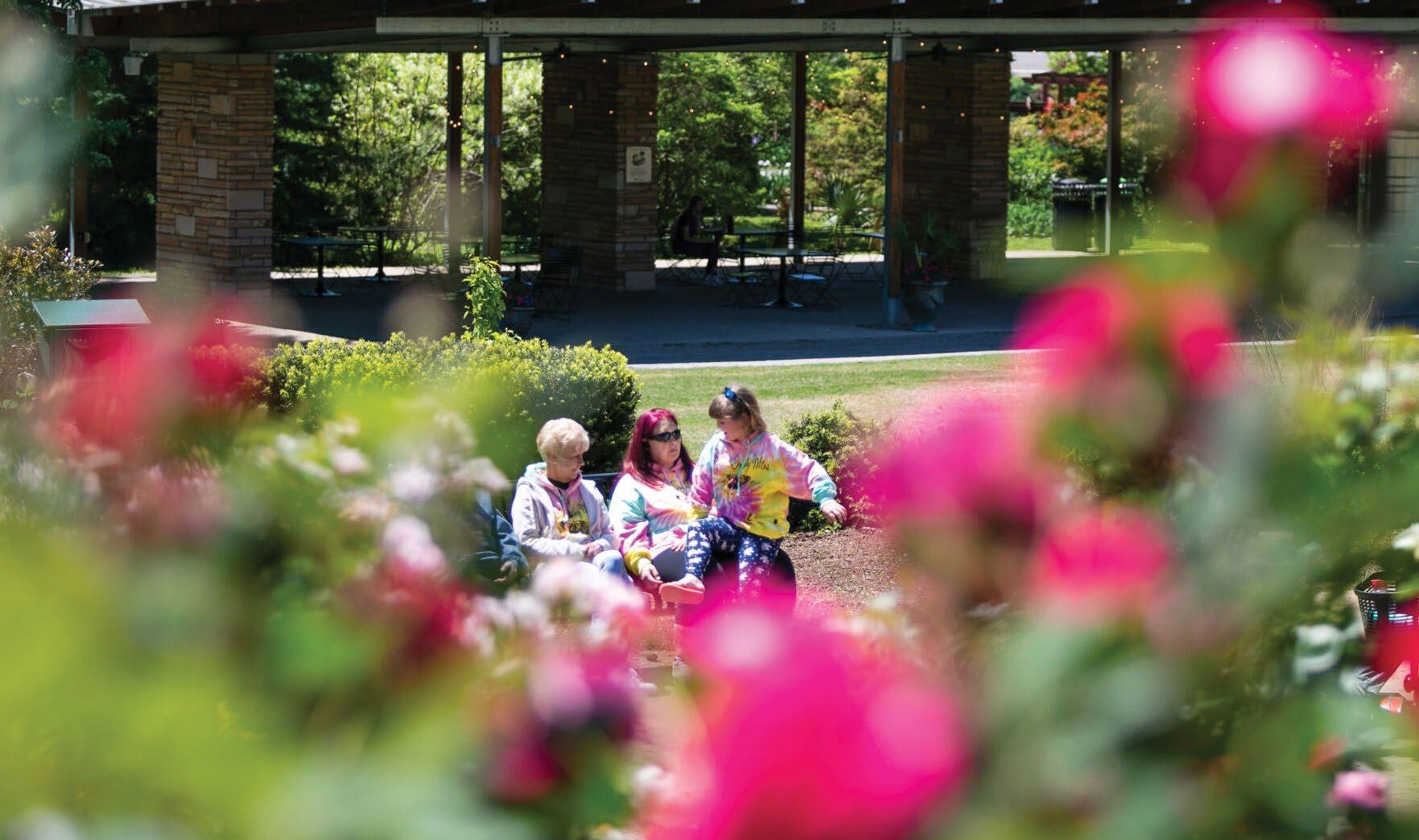
leans heavily on the work of volunteers. With roughly 120 members, the gardens’ volunteer corps is largely made up of work-study students, Americorps volunteers and retired people.
“I love to work, and I can’t sit still. So working outside is great. I’m from Texas, so naturally it’s hot, humid, sunshine — and I like working with my hands and helping the environment, so this job is perfect,” said Brooklyn Harmon, a work-study volunteer and forensic anthropology student.
“I’ve always loved nature and the outdoors, and I think that we can kind of conserve that. Especially with the concrete jungle closing in with more urbanization and higher population density — in East Tennessee I’ve noticed that already. So I think it’s really important that we keep some of our nature, cause when we lose it, we can’t really get it back,” Harmon said.
With over 200 members and 16 ongoing projects, the Knox County master gardeners also play a part in UT Gardens’ upkeep.
“At UT Gardens, the master gardeners perform a lot of functions,” said Cori Holmes, the current president of Knox County master ardeners. “We have master gardeners who take care of their own spot on their own schedule. Then we have master gardeners who come regularly, and they do whatever job needs to be done at that time.”
If you would like to volunteer for UT Gardens, or would just like to visit, you can visit their website. They are free and open to the public from 5 a.m. to 8 p.m. 365 days a year.
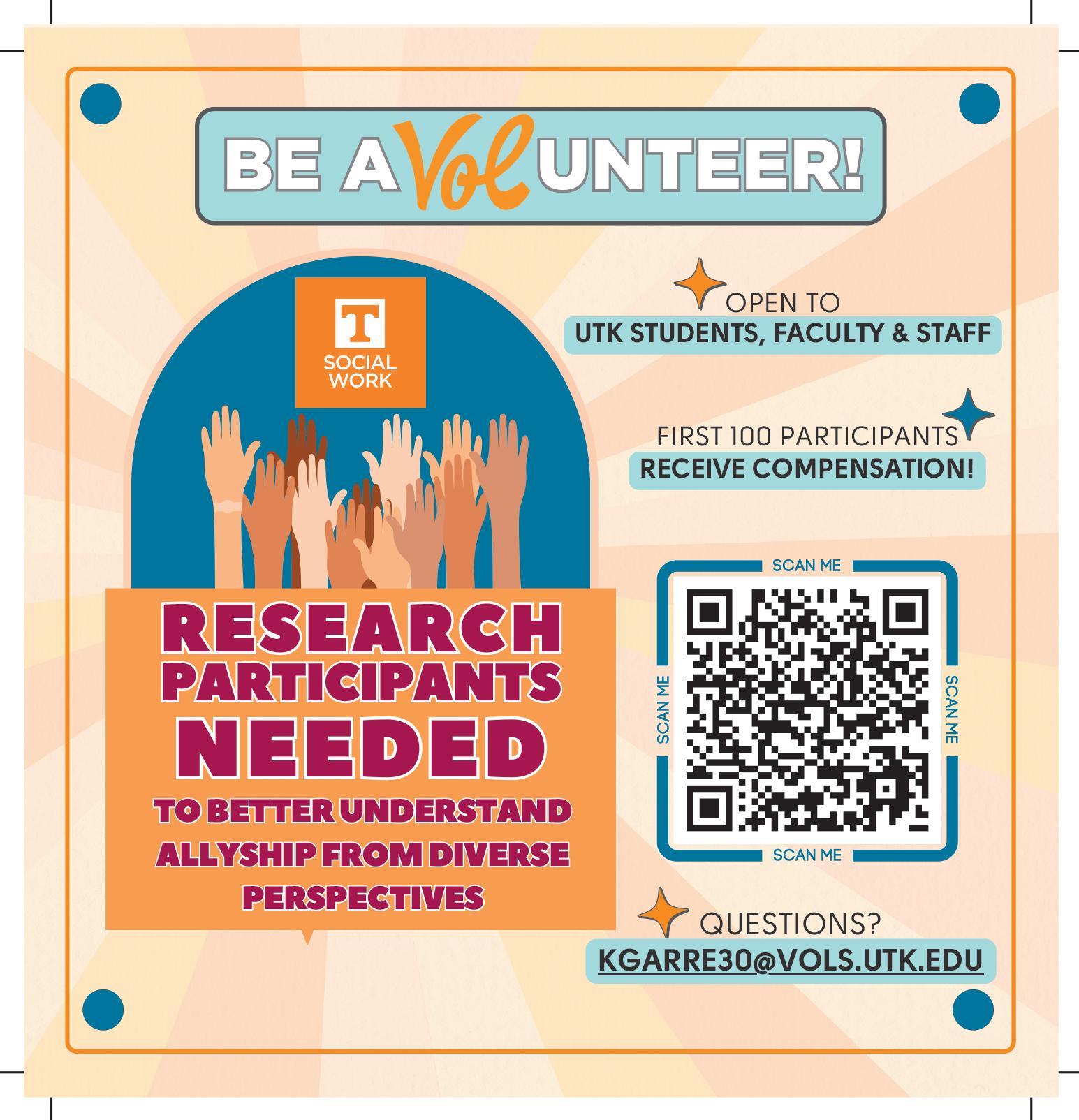
On Monday, April 22, from 11 a.m. to 2 p.m. the Center for Student Engagement and Campus Events Board hosted an Earth Day celebration in the 21st Mortgage Plaza that brought students closer to nature and inspired some to leave with a green thumb.
This event drew a large crowd of students. At check-in, students were provided an Earth Day card that allowed them to get free snow cones from Pelican’s SnoBalls, a free lunch from Penne For Your Thoughts and a free Tshirt. Light snacks and drinks were also provided throughout the festivities.
From their Earth Day card, students had the option to select either a free succulent or a DIY terrarium while supplies lasted that they could take home.
Anna Lattin, a freshman in cinema studies, came to the event to hang out with friends while participating in the multiple crafts the event provided.
“I was really looking forward to the plants,” Lattin said. “I got here a little earlier and they had run out just after I got here, so I got really lucky there. The plants, the terrariums they were offering and the food was pretty good.”
Many student organizations attended the event, including SPEAK, the Sustainable Fashion Club, WUTK and the UT Climbing Club. University organizations like the Center for Basic Needs, CHEW, the Free Store, UT Extension and Smart Yards, UT Gardens, TRECS, UT Compost and One Health Initiative were also there to help celebrate.
Organizations from around the community were also at the event, including the City of Knoxville Department of Waste Management, Keep Knoxville Beautiful and Kickstand.
Maggie Atchley, who represents UT’s Office of Sustainability as their social impact coordinator, attended the event to share about their programs such as the Free Store, food recovery on campus and outreach events.
The Office of Sustainability has a lot in store for the next couple of weeks. From upcoming sustainability symposiums to pollinator parties and creek clean-ups, the Office of Sustainability has events that cater to a vast variety of UT students looking to get involved during Earth Month.
The main event Atchley promoted during her booth at the Earth Day celebration was the Sew Sustainable Fashion Show happening May 1 in the Student Union Auditorium from 6-8 p.m.
“We focus a lot on student upcycling a project that students make themselves. We are bringing in a lot of organizations with sustainability-conscious consumerism in their heart,” Atchley said. “We are super ex-

cited and we have, I believe, 10 makers who have all upcycled outfits for us and then 25 models total that’ll be showing off clothes from the Free Store and also the outfits the student makers have created.”
There will be giveaways and light refreshments provided during the event which is being presented by the Free Store, the Fashion Society, SPEAK and the Sustainable Fashion Club.
Victoria Loftlin represented the Tennessee Smart Yards table as an outreach coordinator while serving with CAC AmeriCorps. Loftlin shared about what students and faculty can do to limit and reduce stormwater runoff on campus, as well as how the Tennessee Smart Yards program can come with certain perks for those who choose to participate.
“The perks you get from certifying your yard is not only are you helping the environment and reducing stormwater runoff, you’re proving your impact and also doing it in a cool and major way by improving your yard and making your yard look pretty,” Loftlin said. “Visit our website at tnyards.utk.edu or come visit us on campus.”
Tennessee Smart Yards works to spread environmentally sustainable landscapes and encourage neighbors to follow suit through a certification program for homeowners. Loft-
lin also provided those who came to the booth with pamphlets on native plants, protecting water quality and managing yard pests.
Karen Caspary, who represents UT Gardens Institute of Agriculture as their volunteer coordinator and horticulturist with the Department of Plant Sciences, handed out romaine lettuce plants grown by students on the Agriculture Campus roughly six weeks prior to the event. It will be ready to eat in about four more weeks under the care provided by the students who received them during the celebration. She shared that the gardens are all about plant science and connecting with people who visit them.
“We are here just sharing about the gardens and telling people as a lot of students don’t ever get out to Ag Campus,” Caspary said. “So, we are just making sure that people are aware this garden is here and it’s for the public to enjoy.”
The UT Gardens provide numerous programs that range from in-depth topics like horticulture to simple plant science covering the joy of growing, as well as environmental stewardship pollinator programs or UTIA therapy programs that delve into the power that plants have with healing people.
Mikayla Hall, a senior studying chemical engineering, attended the event to learn more
about gardening and make friends along the way.
“Today was such a fun-packed few hours,” Hall said. “I met like-minded individuals that are concerned about sustainability and environmental advocacy.”
While there, attendees could participate in making friendship bracelets and coaster painting crafts while listening to the music being played by the WUTK radio station.
“I really enjoyed getting a free lettuce plant from the UT Gardens booth, and I cannot wait to get back home and plant it this evening,” Hall said.
